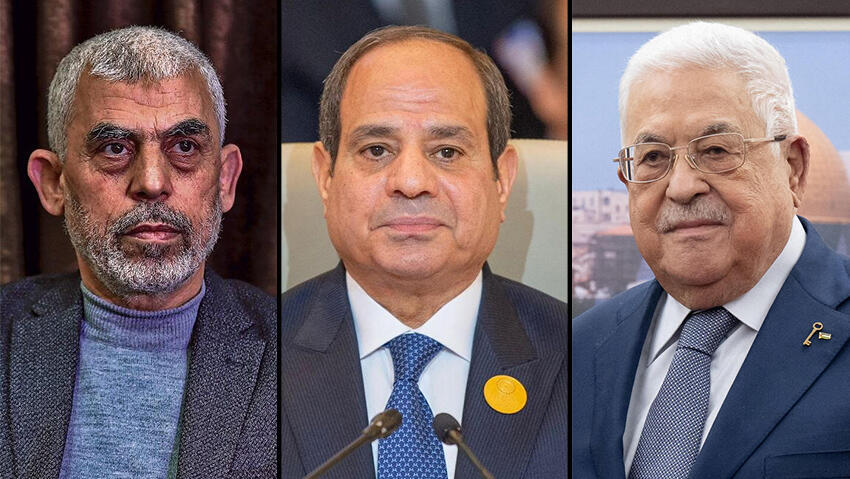When Israel’s Gaza offensive had just began, U.S. President Joe Biden couldn’t possibly have been more on-board with what was going on then he actually was. As clear as day, he went to the nearest microphone and said those ever-so-important words: "We stand with Israel."
Read more:
Alas, the honeymoon phase is over. The more time goes on and civilian casualties continue to mount, and with public opinion noticeably eroding, the more impatient Biden has become with Netanyahu's one-track mind. On Friday, the Israeli premier announced a plan to evacuate the city of Rafah, located on the southern tip of the Gaza Strip and on the border with Egypt. The Israeli administration sees this as a vital step to actualize the number one goal of Israel’s offensive, which is to dismantle Hamas as a governing body within the enclave.
1 View gallery


President Abbas, President al-Sisi and Yahya Sinwar
(Photo: SAUL LOEB/Pool via REUTERS, REUTERS / Saudi Press Agency/Handout, EPA)
But there is a complication. After all, it was the IDF that told Palestinian civilians, whether it was through leaflets or announcements on loudspeakers, that they need to evacuate south in order to avoid being added to the list of casualties. The result of that is that now there are over a million Palestinian refugees in Rafah, noticeably complicating Israeli maneuvering in the area, as the IDF attempts to maintain a civilian casualty list as close to zero as we can possibly get. This effort seems to be so convoluted and rife with potentially catastrophic images of dead civilians, that Biden has labeled this operation “over the top."
Netanyahu, however, remains adamant that this is the only way to destroy Hamas, as Rafah has become its final sanctuary and a prime location for its Egypt-to-Gaza smuggling routes. The Prime Minister’s Office has released an announcement saying “it is clear that a massive operation in Rafah requires the evacuation of the civilian population from the combat zones."
Even National Security Council spokesperson John Kirby, who early on in the war captured Israeli hearts while crying during an interview with Anderson Cooper on CNN while talking about the Hamas massacre on October 7, said “military operations right now would be a disaster for those people, and it’s not something that we would support.” When even John Kirby arrives at that sort of a conclusion, that is as clear as signal as any that US-Israel tensions are mounting beyond an acceptable level, and thus far both sides have failed to achieve a breakthrough.
Secretary of State Antony Blinken similarly left the Middle East on Thursday with little to show for it, after Netanyahu flat out rejected Hamas' demands that stipulated a complete IDF withdrawal from the Gaza Strip, as well as a Palestinian prisoner exchange for Israeli hostages.
Reuven Hazan, a political scientist at the Hebrew University of Jerusalem, told the Wall Street Journal that he believes Netanyahu and Biden have much in common at the moment, as they are both dealing with precarious domestic political situations. While Netanyahu is doing everything he can to recover from a tainted image, manifested by disastrous opinion poles about his performance since the onset of the war, Biden has an election coming up in November, and he’s doing everything he can to shore up support on the Democratic side, before he deals with the Republicans as well.
Warning like an Egyptian
And then you’ve got Israel’s neighbors to the southwest. In case anyone forgot, the Rafah crossing is very close to Egypt’s northeastern end, and President Abdel Fattah El-Sisi has made it abundantly clear that he wishes to avoid a humanitarian catastrophe and an influx of Palestinian refugees streaming into the Sinai Peninsula. He also said that if Palestinians were, in fact, forced by Israel to cross into the Sinai, or if Israel troops themselves made the same move, this could put the decades-long peace treaty between the two countries in a perilous position. Already, Egypt has taken steps to avoid the situation by reinforcing its board with fences, and adding cameras, watch towers and sensors to alert them to anyone trying to break through.
Netanyahu speaking to ABC about the next phase of the fighting
(Video: ABC news)
In an attempt to calm the waters, an Egyptian delegation traveled to Tel Aviv on Friday to hold talks with Israeli counterparts about the situation in Rafah, and while the Israeli side tried to achieve some sort of framework of cooperation about Israel’s ground invasion to Gaza the Egyptians remain unconvinced.
Concurrently, Egypt is also scolding Hamas, as their officials had made it clear to the terrorist organization that should it fail to reach an agreement with Israel within the next two weeks, the IDF would proceed with the ground invasion. Not to be outdone, Hamas replied it would do everything it possibly can to defend Rafah from the IDF and it did not respond to Israeli threats.
CIA chief William Burns is expected to visit Cairo next week for a series of meetings with both Egyptian and Qatari officials, in order to mediate some sort of a cease-fire agreement. The focus, as things stand right now, is to implement some sort of a three-phase agreement that would allow for a 135-day cease-fire. Among possible frameworks, there was a mention of Hamas releasing all the remaining civilian women, children and elderly during the first phase of the cease-fire, which would result in a 45-day pause in fighting. This would be in exchange for hundreds of Palestinian prisoners released from Israeli prisons.
Both the second and third phases of this effort would mean a 45-day pause for each one, with the second phase resulting in a swap of Palestinian prisoners in exchange for Israeli hostages, who are also IDF soldiers, as well as the beginning of a reconstruction effort in the Gaza Srip, which has been bombarded beyond recognition by Israeli forces. Hamas is hoping this phase would include a withdrawal of Israel forces from the strip but, as of yet, Israel has staunchly refused this specific provision.
Not all is lost, though. The Israeli side, while reluctant to agree to a 4-1/2 month cease-fire, has shown some openness to a partial withdrawal of forces, but those that will remain in the Gaza Strip would maintain surveillance during the first phase to make sure Hamas is holding up its end of the bargain.
Egypt bolstering its border with Gaza
Representatives of both the Israeli government and Hamas have thus far declined to comment on the development of these talks.
The needs of the many
Humanitarian officials have expressed grave concern that, on top of having to sleep in tents, located right on the street and leaving them susceptible to harsh weather conditions and famine, many Palestinian refugees would be extremely unlikely to survive a military campaign between the IDF and Hamas, with them being caught smack in the middle.
This concern has been echoed by UN Secretary-General Antonio Guterres. “Half of Gaza‘s population is now crammed into Rafah with nowhere to go. Reports that the Israeli military intends to focus next on Rafah are alarming. Such an action would exponentially increase what is already a humanitarian nightmare with untold regional consequences," he said in a post on the X social media platform.
Devastation in Rafah after IDF attacks
(Video: Reuters)
The grave concern shown for the Palestinian refugees by various officials, is at least partially reinforced by unverified Hamas reports that about 28,000 people, mainly women and children, have already been killed in Gaza since the beginning of the war.





